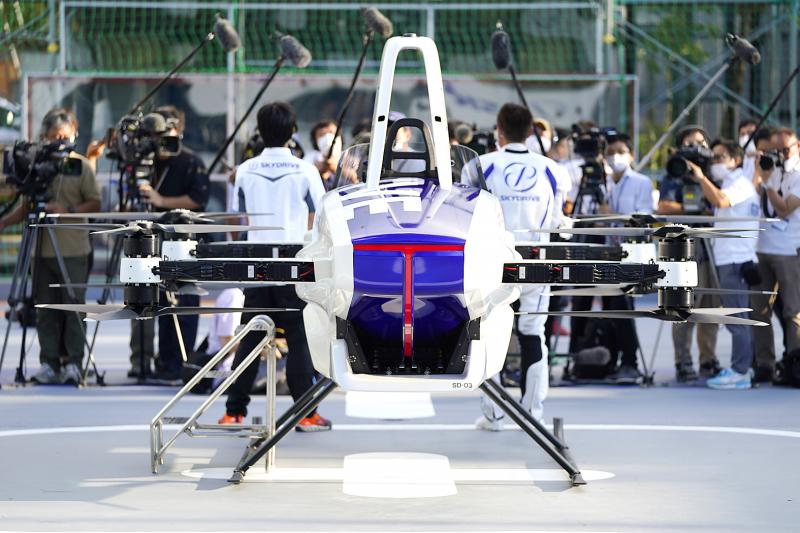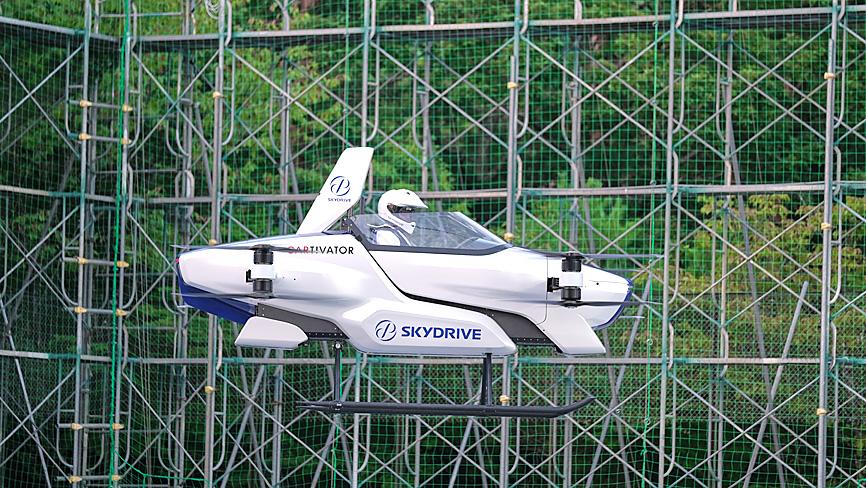The decades-old dream of zipping around in the sky as simply as driving on highways could be becoming less illusory.
Japan’s SkyDrive Inc, among the myriads of “flying car” projects around the world, has carried out a successful though modest test flight with one person aboard.
In a video shown to reporters on Friday, a contraption that looked like a slick motorcycle with propellers lifted 1m to 2m off the ground, and hovered in a netted area for four minutes.

Photo: Bloomberg
SkyDrive chief executive Tomohiro Fukuzawa said he hopes that “the flying car” can be made into a real-life product by 2023, but added that making it safe was critical.
“Of the world’s more than 100 flying car projects, only a handful has succeeded with a person on board,” he said. “I hope many people will want to ride it and feel safe.”
The machine so far can fly for just five to 10 minutes, but if that could become 30 minutes, it would have more potential, including exports to places such as China, Fukuzawa said.

Photo: Reuters / SkyDrive / CARTIVATOR 2020
Unlike airplanes and helicopters, electric vertical takeoff and landing (eVTOL) vehicles offer quick point-to-point personal travel, at least in principle.
They could do away with the hassle of airports and traffic jams, and the cost of hiring pilots. They could fly automatically.
Battery sizes, air traffic control and other infrastructure issues are among the many potential challenges to commercializing them.
“Many things have to happen,” said Sanjiv Singh, professor at the Robotics Institute at Carnegie Mellon University, who cofounded Near Earth Autonomy, near Pittsburgh, Pennsylvania, which is also working on an eVTOL aircraft.
“If they cost US$10 million, no one is going to buy them. If they fly for five minutes, no one is going to buy them. If they fall out of the sky every so often, no one is going to buy them,” Singh said in a telephone interview.
The SkyDrive project began humbly as a volunteer project called Cartivator in 2012, with funding by top Japanese companies including automaker Toyota Motor Corp, electronics company Panasonic Corp and video game developer Bandai Namco.
A demonstration flight three years ago went poorly, but it has improved and the project recently received another round of funding of ¥3.9 billion (US$37 million), including from the Development Bank of Japan.
The Japanese government is bullish on “the Jetsons” vision, with a “road map” for business services by 2023, and expanded commercial use by the 2030s, stressing its potential for connecting remote areas and providing lifelines in disasters.
Experts compare the buzz over flying cars to the days when the aviation industry got started with the Wright brothers and the auto industry with the Ford Model T.
Lilium of Germany, Joby Aviation in California and Wisk Aero, a joint venture between Boeing Co and Kitty Hawk Corp, are also working on eVTOL projects.
Kitty Hawk chief executive Sebastian Thrun said that it took time for airplanes, cellphones and self-driving vehciles to win acceptance, “but the time between technology and social adoption might be more compressed for eVTOL vehicles.”

WEAKER ACTIVITY: The sharpest deterioration was seen in the electronics and optical components sector, with the production index falling 13.2 points to 44.5 Taiwan’s manufacturing sector last month contracted for a second consecutive month, with the purchasing managers’ index (PMI) slipping to 48, reflecting ongoing caution over trade uncertainties, the Chung-Hua Institution for Economic Research (CIER, 中華經濟研究院) said yesterday. The decline reflects growing caution among companies amid uncertainty surrounding US tariffs, semiconductor duties and automotive import levies, and it is also likely linked to fading front-loading activity, CIER president Lien Hsien-ming (連賢明) said. “Some clients have started shifting orders to Southeast Asian countries where tariff regimes are already clear,” Lien told a news conference. Firms across the supply chain are also lowering stock levels to mitigate

Six Taiwanese companies, including contract chipmaker Taiwan Semiconductor Manufacturing Co (TSMC, 台積電), made the 2025 Fortune Global 500 list of the world’s largest firms by revenue. In a report published by New York-based Fortune magazine on Tuesday, Hon Hai Precision Industry Co (鴻海精密), also known as Foxconn Technology Group (富士康科技集團), ranked highest among Taiwanese firms, placing 28th with revenue of US$213.69 billion. Up 60 spots from last year, TSMC rose to No. 126 with US$90.16 billion in revenue, followed by Quanta Computer Inc (廣達) at 348th, Pegatron Corp (和碩) at 461st, CPC Corp, Taiwan (台灣中油) at 494th and Wistron Corp (緯創) at

NEGOTIATIONS: Semiconductors play an outsized role in Taiwan’s industrial and economic development and are a major driver of the Taiwan-US trade imbalance With US President Donald Trump threatening to impose tariffs on semiconductors, Taiwan is expected to face a significant challenge, as information and communications technology (ICT) products account for more than 70 percent of its exports to the US, Chung-Hua Institution for Economic Research (CIER, 中華經濟研究院) president Lien Hsien-ming (連賢明) said on Friday. Compared with other countries, semiconductors play a disproportionately large role in Taiwan’s industrial and economic development, Lien said. As the sixth-largest contributor to the US trade deficit, Taiwan recorded a US$73.9 billion trade surplus with the US last year — up from US$47.8 billion in 2023 — driven by strong

ASE Technology Holding Co (ASE, 日月光投控), the world’s biggest chip assembly and testing service provider, yesterday said it would boost equipment capital expenditure by up to 16 percent for this year to cope with strong customer demand for artificial intelligence (AI) applications. Aside from AI, a growing demand for semiconductors used in the automotive and industrial sectors is to drive ASE’s capacity next year, the Kaohsiung-based company said. “We do see the disparity between AI and other general sectors, and that pretty much aligns the scenario in the first half of this year,” ASE chief operating officer Tien Wu (吳田玉) told an